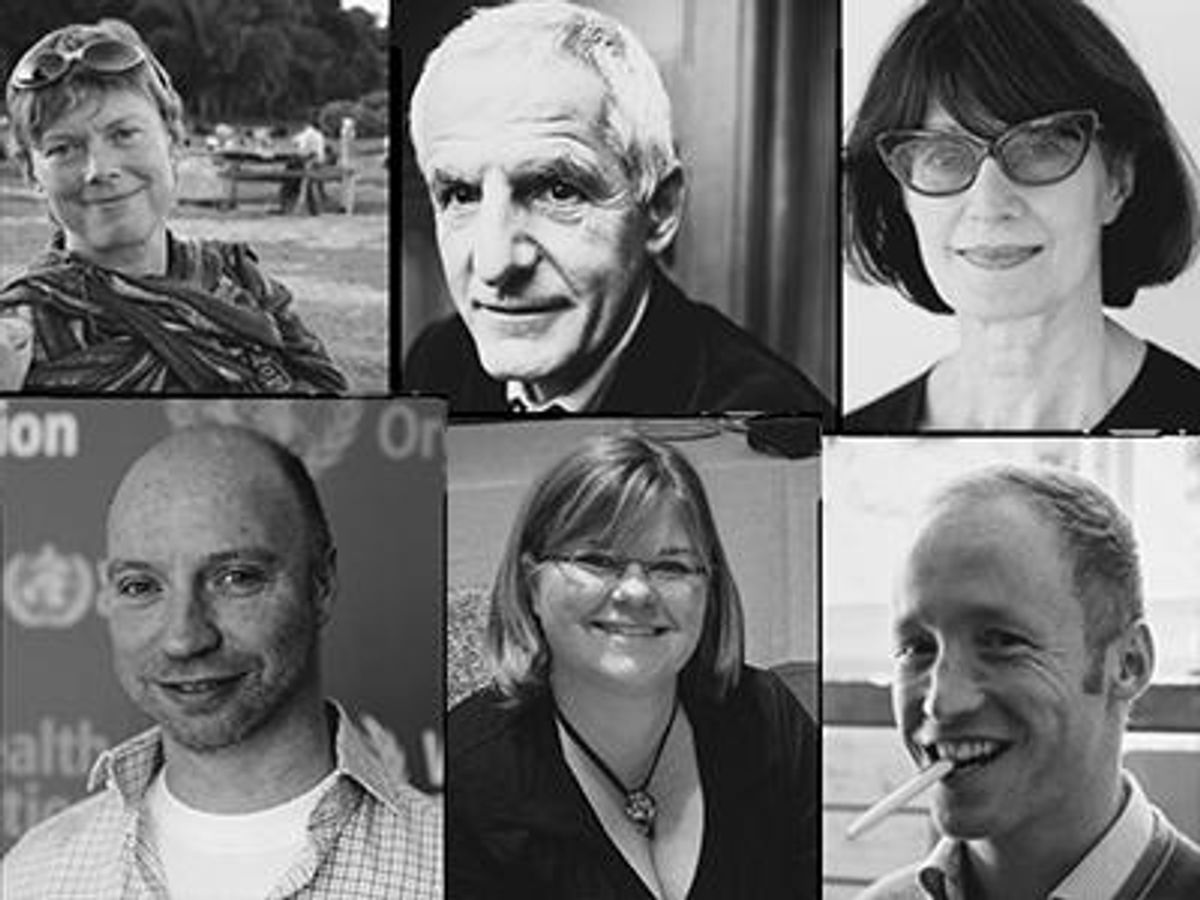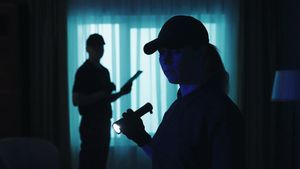 Hrabove is a small village in eastern Ukraine, about 30 miles from the Russian border. It's a former Soviet collective farm that today has one store, an Orthodox church built in the 19th century, and approximately 1,000 townspeople. Coal mining is a major industry -- or was until Russia annexed Crimea and violence forced mines and factories to shutter. Villagers eke out a living however they can, often scrabbling among the fields of wheat and sunflowers that stretch vividly to the horizon.
Hrabove is a small village in eastern Ukraine, about 30 miles from the Russian border. It's a former Soviet collective farm that today has one store, an Orthodox church built in the 19th century, and approximately 1,000 townspeople. Coal mining is a major industry -- or was until Russia annexed Crimea and violence forced mines and factories to shutter. Villagers eke out a living however they can, often scrabbling among the fields of wheat and sunflowers that stretch vividly to the horizon.
On July 17, 2014, the world abruptly descended on Hrabove. At 4:20 p.m. local time, Malaysia Airlines Flight 17 crashed in the fields surrounding the village, scattering bodies and debris over eight square miles. "There was a howling noise and everything started to rattle," a witness told Reuters. "Then objects started falling out of the sky."
The plane's fuselage landed in a cabbage patch in the neighboring village of Petropavlivka; a bin of overhead luggage compartments fell neatly into the crook of two trees; everything else -- tires, ailerons, engine parts, headrests -- rained in indiscriminate chaos across countryside that was now charred and roiling with smoke. "We thought it was the end of the world," Hrabove's local priest told reporters.
While investigators later concluded that pro-Russian separatists shot down the plane using a BUK surface-to-air missile, the hours following the crash were hazy with rushed news reports and images of surreal carnage. One of the most alarming headlines, repeated by major international media outlets as well as President Barack Obama, was that nearly 100 delegates en route to the 2014 International AIDS Conference in Melbourne were aboard the plane. In fact, there were six delegates, including Joep Lange, a Dutch researcher who had done pioneering studies in HIV and AIDS since the start of the epidemic.
 "It's an incredibly absurd thing," Catherine Hankins says via Skype. She worked with Lange at the Amsterdam Institute for Global Health and Development. Also killed was Jacqueline van Tongeren, Lange's partner and the director of communications at AIGHD. "I'm at her desk right now," Hankins says. "Nobody wanted to take her desk, but I said it would be a privilege. I have a picture of her in front of me. I have all of her knick-knacks. She was basically my best friend in Amsterdam, so this has been hard."
"It's an incredibly absurd thing," Catherine Hankins says via Skype. She worked with Lange at the Amsterdam Institute for Global Health and Development. Also killed was Jacqueline van Tongeren, Lange's partner and the director of communications at AIGHD. "I'm at her desk right now," Hankins says. "Nobody wanted to take her desk, but I said it would be a privilege. I have a picture of her in front of me. I have all of her knick-knacks. She was basically my best friend in Amsterdam, so this has been hard."
Although Lange and van Tongeren were the most prominent of the six delegates, the deaths of the other four -- Pim de Kuijer, Martine de Schutter, Lucie van Mens, and Glenn Thomas -- also sent shockwaves through the tight-knit HIV and AIDS community. "The blow has been enormous," says Ton Coenen, executive director of AIDS Fonds. "[They were] all passionate people who made a unique contribution."
Lange had been a trailblazer in AIDS clinical research since the early 1980s. He was a former president of the International AIDS Society, and he advocated bringing treatment to developing countries. His oft-quoted mantra was, "If we can get a cold can of Coke to any part of Africa, we can certainly deliver AIDS treatment." To prove that, he founded PharmAccess, which partnered with companies including Heineken, Unilever, and Shell to distribute antiretrovirals to employees and their dependents throughout Africa. At the time of his death, he was experimenting with programs that deliver treatment to rural clinics in Tanzania.
"Joep was a godlike figure in the field," says Sharon Lewin, cochair of the 2014 AIDS Conference. She and Lange met in Bangkok, where he helped found the Netherlands-Australia-Thailand Research Collaboration in the '90s. The organization worked to introduce two-drug cocktails to Thai HIV patients. Lange was one of the first researchers to push for combination therapy, a radical idea in the virus's early days. He was also involved in the PETRA study that analyzed mother-to-child transmission in Tanzania, Uganda, and South Africa. More recently, his focus had shifted from treatment to cure. NOVA, a new study in the Netherlands, was exploring how drug therapy immediately following HIV infection could prevent the virus from seeding reservoirs.
"He was very optimistic about a cure," Hankins says. So was his partner, van Tongeren, who frequently accompanied him to AIDS conferences. "Her family described her as their Florence Nightingale because she played that role in the family as well."
Lange and van Tongeren met in 1989, when she became head nurse of the AIDS ward at the Academic Medical Center in Amsterdam. Six months later, Lange recruited her as the clinical director of his research team. In the past seven or eight years, their longstanding professional relationship turned romantic.

"Joep did a lot, but he wouldn't have been able to do it without Jacqueline," says Seema Yasmin, a doctor and journalist who knew the couple well. "There was a lot of gentleness between them, a lot of respect."
Van Tongeren had owned an art gallery in Amsterdam in the '70s and remained immersed in the city's cultural life. She campaigned to preserve Dutch heritage sites and planned to partially retire at the end of 2014; she talked about opening another gallery someday. Hankins, who shared an office with van Tongeren, remembers her as "elegant, beautiful, young beyond her age, and with a great sense of humor."
On the day of the crash, Hankins was visiting her sick father in Calgary, Canada. Her partner called with the news. "There was nobody else home, and I just yelled," she says. "There was no way. It was too absurd."
The next day she returned to Amsterdam and found the AIGHD office nearly deserted except for junior staffers, most of whom were still dazed. "I just kept my door open, and people came. They were teary and distraught and angry. They said things like: 'I don't know what to do. I came here because of Joep.'"
Finding dark humor in the tragedy has been one way to soften the hurt. Hankins mentions Lange's dog, for example. "This is a dog that's now 13 or 14, has diabetes, who requires insulin shots twice a day, and regular bouts of exercise. How on earth did she outlive them?" For Margot Mulder, a communications officer at the Female Health Company, the humor she recalls is more foreboding. Her colleague, Lucie van Mens, had bought a gravesite early last year. "Her sister worked for a funeral company, and she said to Lucie, 'There's a nice area in the Netherlands if you're looking for a grave.' Lucie made jokes about it all that last year."
Van Mens had worked with various Dutch HIV and AIDS organizations since 1995. She was particularly passionate about the sex worker industry and was an activist for sexually transmitted diseases education, HIV treatment and prevention, and female condoms. She was also a seasoned traveler who'd trekked through remote tracts of Africa and Eastern Europe. "She wished to retire in three years," Mulder says. "She wanted to show many African countries to her partner, Gerd."
The couple were together 15 years, and Mulder broke the news of van Mens's death to Gerd. "It's still very hard for him," she says. "He's not able to work. He's a psychologist who works with refugees, but it's not possible for him to diagnose people anymore." Now he's embroiled in the administrative aftermath of paperwork and financial claims. Mulder says a legal team is now liaising with the families of MH17 victims to ensure financial compensation from Ukraine, the Netherlands, and, in Gerd's case, the United States, where van Mens's employer was headquartered.
"I've come to realize I'll never see her again," Mulder says. "But I can still hear her fingers on the keyboard." On September 16, 2014 -- Global Female Condom Day -- the Female Health Company celebrated by watching funny videos in the office. "There was this movie of Dutch women who were dancing, old women not known for their smooth moves, and I laughed really hard. I turned to Lucie's desk because I wanted to share it with her. ... It's in those moments I realize she's gone."
Glenn Thomas's desk at the World Health Organization became a makeshift memorial in the days after his death. Flowers, framed photos, and votive candles paid tribute to the 49-year-old media coordinator. His nephew Jordan Withers told the Telegraph: "He was like a best friend. The kind of things he used to do -- on a Christmas morning he came in with a huge box and there were all these cut out letters which spelled the word Disneyland, and the next morning we were on the plane to Disneyland. That's the kind of person he was."
Thomas grew up in Blackpool, a popular seaside resort in England. He studied economics at Bangor University in North Wales and later joined the BBC as a journalist. In 2012, he began working with WHO to promote its latest report on HIV. His family was one of the few to publicly condemn both Malaysia Airlines and the Ukrainian rebels who reportedly desecrated bodies. "Malaysia Airlines have been absolutely terrible," Withers told the Telegraph: "I was trying to get through to [them] and I was given three different numbers. I was hysterical on the phone and just said, 'I want one number.' My mum and dad had the same experience." He also lamented the recovery effort: "They have been loading them on to trains like cargo. And it's just degrading and inhumane. You wouldn't treat anyone like that."
On January 17, he tweeted: "#MH17 6 months to the day I lost my Uncle Glenn. #weneedjustice," alluding to the bodies that have not yet been recovered, as well as Russia's refusal to accept responsibility for the tragedy. The crash site is now more or less abandoned, an eerie wasteland heralded by a warning sign: "No Entrance! There may be remains of the victims of flight MH17 crash at the territory."

For other families, including that of Pim de Kuijer, closure was more immediate. The Dutch government normally requires a body before families are entitled to a death certificate, burial, or will; if there's no body, families must wait one year for such formalities. Following MH17, however, the government suspended that requirement. "Pim's family was the first," Hankins said. "They went ahead having a separate celebration for his life. They weren't going to wait for the identification process not knowing how long that would take or whether it would be successful."
De Kuijer was a lobbyist with Stop AIDS Now and a member of D66, a progressive political party in the Netherlands. "I was an activist diplomat, but I prefer to be a diplomatic activist now," he was fond of saying. He'd been an election observer for the Dutch Foreign Ministry and the EU, traveling throughout Egypt, Kosovo, Sierra Leone, Russia, Ukraine, and other countries. His colleague, Lousewies van der Laan, remembers, "We had developed a tradition meeting at foreign airports -- Beijing, Sarajevo -- and then trying to install some democracy into the place, while catching up, having good food and celebrating life and shared values." His brother, Paul, agrees; Pim "wanted an intense life. He didn't just want to sit on a couch."
De Kuijer successfully lobbied the Dutch parliament to reverse a 12 million-euro cut to AIDS funding and helped block a bill that required mandatory registration for sex workers. "He loved the political dynamics and the games played," says Coenen, recalling that de Kuijer would use chocolate or a drink after work to persuade noncommittal colleagues to rally around him. He also had a mischievous sense of humor. "One of the most remarkable memories that was so typically Pim was that he came out as a gay person at age 30 in a comedy cafe where he had invited his friends and made a big show out of it," Coenen says. For his family, de Kuijer is something else: a martyr for the causes that kept him campaigning restlessly around the world. Recalling that final day, his mother told Channel 4: "I only said I loved him, and he texted back 'I love you too.' Our son should not be dead."

Martine de Schutter was a fellow lobbyist, or as she described herself, a cultural anthropologist specializing in gender and sexual health. Like de Kuijer, she was a globetrotter, living in the United States, South America, and the Netherlands. For a decade she led AIDS Action Europe, a multinational network designed to streamline civil society's response to HIV in Europe and Central Asia. In January 2014, she became program manager at Bridging the Gaps, an organization seeking equitable AIDS treatment for vulnerable populations in 16 countries. "Her work was very important to her," Coenen says, "but even more important was her son Maarten." A glance at her Facebook reveals a devoted mother: "Celebrating Maarten's 13th birthday with homemade sushi," reads one post; another shows her and Maarten ice-skating; yet another shows them at Christmas, crouched in front of a lit tree. When I ask Coenen about the best way to honor her legacy, he says simply, "Keep the work going."
That's the refrain among the people I interviewed: Keep fighting the fight. "In a way, they did their work, and there's still a tremendous amount of very smart and passionate people in the AIDS field, so their work will be taken care of," Mulder says. ""There are many Lucies and many Joeps, luckily, who can do the job, but they will always be an eternal inspiration." Perhaps the most apt tribute is a text message Lange sent on the day he died, lamenting his inevitable jetlag. He said that he may have trouble sleeping, but it would just give him more time to work.
Portrait credits: Alek (Lange); Courtesy Pharmaccess Group (Van Tongeren); Roy van der Linden (De Kuijer); Courtesy World Health Organization (Thomas)


 Hrabove is a small village in eastern Ukraine, about 30 miles from the Russian border. It's a former Soviet collective farm that today has one store, an Orthodox church built in the 19th century, and approximately 1,000 townspeople. Coal mining is a major industry -- or was until Russia annexed Crimea and violence forced mines and factories to shutter. Villagers eke out a living however they can, often scrabbling among the fields of wheat and sunflowers that stretch vividly to the horizon.
Hrabove is a small village in eastern Ukraine, about 30 miles from the Russian border. It's a former Soviet collective farm that today has one store, an Orthodox church built in the 19th century, and approximately 1,000 townspeople. Coal mining is a major industry -- or was until Russia annexed Crimea and violence forced mines and factories to shutter. Villagers eke out a living however they can, often scrabbling among the fields of wheat and sunflowers that stretch vividly to the horizon.





























 "It's an incredibly absurd thing," Catherine Hankins says via Skype. She worked with Lange at the Amsterdam Institute for Global Health and Development. Also killed was Jacqueline van Tongeren, Lange's partner and the director of communications at AIGHD. "I'm at her desk right now," Hankins says. "Nobody wanted to take her desk, but I said it would be a privilege. I have a picture of her in front of me. I have all of her knick-knacks. She was basically my best friend in Amsterdam, so this has been hard."
"It's an incredibly absurd thing," Catherine Hankins says via Skype. She worked with Lange at the Amsterdam Institute for Global Health and Development. Also killed was Jacqueline van Tongeren, Lange's partner and the director of communications at AIGHD. "I'm at her desk right now," Hankins says. "Nobody wanted to take her desk, but I said it would be a privilege. I have a picture of her in front of me. I have all of her knick-knacks. She was basically my best friend in Amsterdam, so this has been hard." "Joep did a lot, but he wouldn't have been able to do it without Jacqueline," says Seema Yasmin, a doctor and journalist who knew the couple well. "There was a lot of gentleness between them, a lot of respect."
"Joep did a lot, but he wouldn't have been able to do it without Jacqueline," says Seema Yasmin, a doctor and journalist who knew the couple well. "There was a lot of gentleness between them, a lot of respect." For other families, including that of Pim de Kuijer, closure was more immediate. The Dutch government normally requires a body before families are entitled to a death certificate, burial, or will; if there's no body, families must wait one year for such formalities. Following MH17, however, the government suspended that requirement. "Pim's family was the first," Hankins said. "They went ahead having a separate celebration for his life. They weren't going to wait for the identification process not knowing how long that would take or whether it would be successful."
For other families, including that of Pim de Kuijer, closure was more immediate. The Dutch government normally requires a body before families are entitled to a death certificate, burial, or will; if there's no body, families must wait one year for such formalities. Following MH17, however, the government suspended that requirement. "Pim's family was the first," Hankins said. "They went ahead having a separate celebration for his life. They weren't going to wait for the identification process not knowing how long that would take or whether it would be successful."


















































